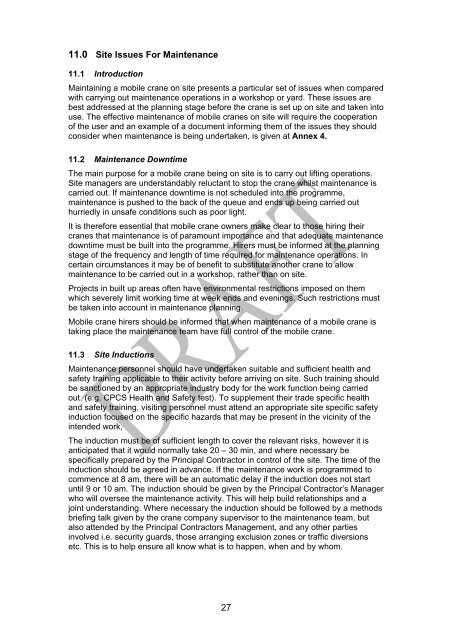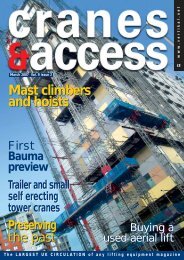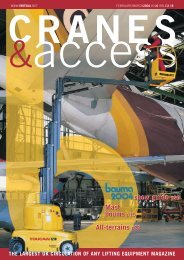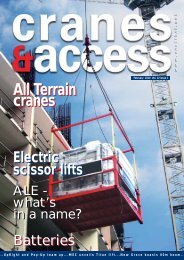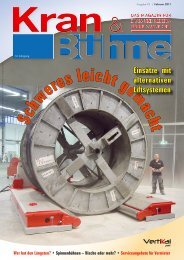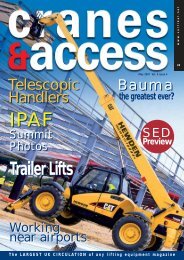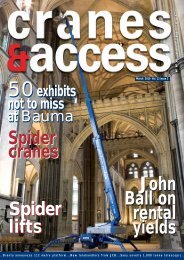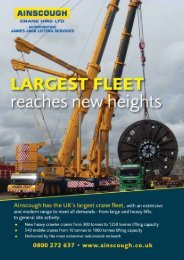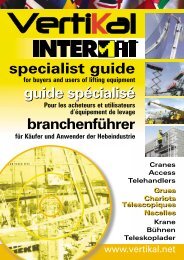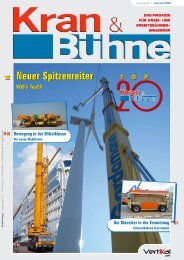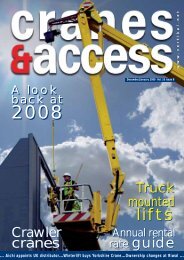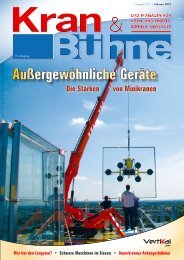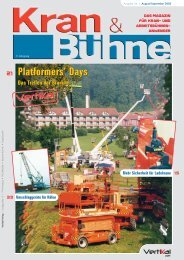Maintenance, Inspection and Thorough Examination of Mobile Cranes
Maintenance, Inspection and Thorough Examination of Mobile Cranes
Maintenance, Inspection and Thorough Examination of Mobile Cranes
Create successful ePaper yourself
Turn your PDF publications into a flip-book with our unique Google optimized e-Paper software.
11.0 Site Issues For <strong>Maintenance</strong><br />
11.1 Introduction<br />
Maintaining a mobile crane on site presents a particular set <strong>of</strong> issues when compared<br />
with carrying out maintenance operations in a workshop or yard. These issues are<br />
best addressed at the planning stage before the crane is set up on site <strong>and</strong> taken into<br />
use. The effective maintenance <strong>of</strong> mobile cranes on site will require the cooperation<br />
<strong>of</strong> the user <strong>and</strong> an example <strong>of</strong> a document informing them <strong>of</strong> the issues they should<br />
consider when maintenance is being undertaken, is given at Annex 4.<br />
11.2 <strong>Maintenance</strong> Downtime<br />
The main purpose for a mobile crane being on site is to carry out lifting operations.<br />
Site managers are underst<strong>and</strong>ably reluctant to stop the crane whilst maintenance is<br />
carried out. If maintenance downtime is not scheduled into the programme,<br />
maintenance is pushed to the back <strong>of</strong> the queue <strong>and</strong> ends up being carried out<br />
hurriedly in unsafe conditions such as poor light.<br />
It is therefore essential that mobile crane owners make clear to those hiring their<br />
cranes that maintenance is <strong>of</strong> paramount importance <strong>and</strong> that adequate maintenance<br />
downtime must be built into the programme. Hirers must be informed at the planning<br />
stage <strong>of</strong> the frequency <strong>and</strong> length <strong>of</strong> time required for maintenance operations. In<br />
certain circumstances it may be <strong>of</strong> benefit to substitute another crane to allow<br />
maintenance to be carried out in a workshop, rather than on site.<br />
Projects in built up areas <strong>of</strong>ten have environmental restrictions imposed on them<br />
which severely limit working time at week ends <strong>and</strong> evenings. Such restrictions must<br />
be taken into account in maintenance planning.<br />
<strong>Mobile</strong> crane hirers should be informed that when maintenance <strong>of</strong> a mobile crane is<br />
taking place the maintenance team have full control <strong>of</strong> the mobile crane.<br />
11.3 Site Inductions<br />
<strong>Maintenance</strong> personnel should have undertaken suitable <strong>and</strong> sufficient health <strong>and</strong><br />
safety training applicable to their activity before arriving on site. Such training should<br />
be sanctioned by an appropriate industry body for the work function being carried<br />
out. (e.g. CPCS Health <strong>and</strong> Safety test). To supplement their trade specific health<br />
<strong>and</strong> safety training, visiting personnel must attend an appropriate site specific safety<br />
induction focused on the specific hazards that may be present in the vicinity <strong>of</strong> the<br />
intended work,<br />
The induction must be <strong>of</strong> sufficient length to cover the relevant risks, however it is<br />
anticipated that it would normally take 20 – 30 min, <strong>and</strong> where necessary be<br />
specifically prepared by the Principal Contractor in control <strong>of</strong> the site. The time <strong>of</strong> the<br />
induction should be agreed in advance. If the maintenance work is programmed to<br />
commence at 8 am, there will be an automatic delay if the induction does not start<br />
until 9 or 10 am. The induction should be given by the Principal Contractor’s Manager<br />
who will oversee the maintenance activity. This will help build relationships <strong>and</strong> a<br />
joint underst<strong>and</strong>ing. Where necessary the induction should be followed by a methods<br />
briefing talk given by the crane company supervisor to the maintenance team, but<br />
also attended by the Principal Contractors Management, <strong>and</strong> any other parties<br />
involved i.e. security guards, those arranging exclusion zones or traffic diversions<br />
etc. This is to help ensure all know what is to happen, when <strong>and</strong> by whom.<br />
27


